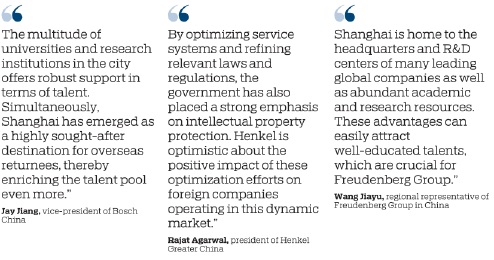Shanghai, a city on the path to becoming an international hub for science and technology innovation, has witnessed a remarkable surge in the establishment of foreign-funded research and development centers over the past three years.
Official statistics show an impressive growth in the number of these centers, with a total of 551 recorded in the first three quarters of 2023, as compared to 418 centers by the end of 2020. This significant increase serves as a testament to the city's allure and appeal to foreign investors who are seeking an ideal environment to nurture their innovative ventures.
Shanghai, long regarded as a distinguished destination for foreign companies, boasts an impressive count of 940 regional headquarters during the first three quarters, cementing its position as a prominent player in developing the headquarters economy in China.
Global companies have cited several factors that have influenced their decision to establish R&D facilities in Shanghai, with the most commonly mentioned being the city's expanding business opportunities, world-class infrastructure, favorable business environment, enhancing government services and efficiency and supportive atmosphere for innovation. This supportive environment encompasses a few key elements, including access to a talented pool of professionals, a robust level of capital support and a vibrant community of highly motivated startups.
Supporting transformation
Henkel, a German chemical and consumer goods business, announced in 2021 it was to transform its current Zhangjiang site in Pudong New Area of Shanghai into the Inspiration Center for China and the Asia-Pacific region to better embrace the Chinese market and empower the country's industrial and consumption upgrade.
"Once operational, the center will become our second-largest innovation hub in the world, allowing more than 400 Henkel experts and scientists to develop new technologies that support all Henkel Adhesive Technologies business and service areas," said Rajat Agarwal, president of Henkel Greater China. "The advanced facility will also serve as a center for customer interaction and knowledge sharing. Through innovative customer collaboration and direct access to Henkel's experts and application portfolio, the facility will inspire new opportunities."
According to Agarwal — who is one of 50 recipients of the prestigious 2023 Magnolia Silver Awards, a prize set by the Shanghai government in recognition of foreigners' contributions to the city's development and international exchange — Shanghai's continuous dedication to fostering innovation and the city's enhancing government services have solidified Henkel's confidence in this thriving metropolis.
Agarwal describes Shanghai's business environment in two keywords: open and optimization.
"The local government has played a pivotal role in enhancing the business landscape over the years. Through streamlined administrative processes and advantageous tax policies, it has fostered increased market openness," he said. "By optimizing service systems and refining relevant laws and regulations, the government has also placed a strong emphasis on intellectual property protection. Henkel is optimistic about the positive impact of these optimization efforts on foreign companies operating in this dynamic market."
In early 2023, Henkel was certificated by the Shanghai government for its regional headquarters. Agarwal said that the acknowledgment underscores Henkel's dedication to local business, talent development and the innovative environment.
"Today, Shanghai is actively charting its course to become a globally influential hub for scientific and technological innovation. The city has proven to be a convergence point for substantial innovation, cutting-edge technology and exceptional talents, making it an ideal place for advancing our innovation and production capabilities," Agarwal said.
Serving mobility change
Bosch, a company that first established its presence in China in 1909, is pursuing business opportunities and meeting the evolving demands of the smart and electrified mobility sector in the country. Shanghai, known for its foundations in the automotive industry, stands as one of the major hubs within Bosch's innovation network in China.
In 2022, the enterprise achieved a new milestone with the establishment of the Bosch Cross-Domain Computing Solutions (Shanghai) R&D Center in the Pudong New Area of Shanghai. According to Bosch China, the R&D center, the third of its kind in China, was established with an investment of 150 million yuan ($21.07 million) and boasts a team of more than 1,400 highly skilled engineers. Its primary focus lies in the development of advanced driving solutions and information domain computers for Bosch.
During the 2023 China International Import Expo held in November in Shanghai, Bosch showcased the advanced driving solution developed by the Bosch Cross-Domain Computing Solutions (Shanghai) R&D Center. This cutting-edge solution is set to begin mass production in the fourth quarter. Notably, the solution features endto-end navigation on autopilot, or NOA, functions specifically designed for highways and expressways. Additionally, urban end-to-end NOA functions are set to be progressively released in 2024 through Over-The-Air updates, enhancing the solution's capabilities.
Apart from the R&D center for intelligent mobility, Shanghai is the home to a Bosch Corporate Research team, which brings together experts from various disciplines to collaborate across departments and fields to carry out advanced research and development to better serve future trends.
According to Jay Jiang, vice-president of Bosch China, Shanghai's openness and inclusiveness have established a foundation for fostering a vast pool of talented individuals, thereby making it a favored place for innovation.
"The multitude of universities and research institutions in the city offers robust support in terms of talent. Simultaneously, Shanghai has emerged as a highly sought-after destination for overseas returnees, thereby enriching the talent pool even more," said Jiang. "The well-established ecosystem for automobiles, active capital market which could provide fund support to startups, and government's open attitude toward new developments all make Shanghai an ideal innovation hub."
Jiang said Bosch will continue to embrace the intelligent mobility industry in China and continue to bring cutting-edge products for automation, electrification, personalization and connectivity to the Chinese market.
In 2022, Bosch China achieved a sales revenue of 132.1 billion yuan, marking a year-on-year increase of nearly 3 percent. Bosch Mobility Solutions sales hit a record of more than 100 billion yuan, according to Jiang. In 2022, more than 9,000 out of 35,000 employees in Bosch China Mobility Solutions sector were dedicated to R&D.
In addition to its efforts to enhance intelligent and electrified mobility development, Bosch China is spearheading innovation and assisting the commercialization of hydrogen fuel cell technology.
"Bosch is confident in long-term potential of the Chinese market and will continue its investment, especially in the Yangtze River Delta," Jiang said.
Looking for mutual prosperity
Freudenberg Group, a German conglomerate operating in manufacturing and technology services across 60 countries and regions, recognizes the immense potential of Shanghai's innovative ecosystem and China's national strategy for integrated development in the Yangtze River Delta. Freudenberg aims to seize emerging business opportunities in sectors such as green development and electrified mobility.
In 2022, Freudenberg Group established its local technology innovation department in Shanghai, primarily focusing on forward-looking research in fields such as electric mobility, new energy, sustainability and intelligent manufacturing. Through open innovation, Freudenberg aims to explore emerging technologies domestically and seek collaborations with Chinese universities, research institutions and startups.
According to Wang Jiayu, a regional representative of Freudenberg Group in China, the strong support from the government and an improved business environment have significantly boosted the confidence of foreign investors to establish R&D facilities in Shanghai.
"Since China's economic reforms, many foreign companies have benefited from China's opening-up, with Shanghai at the forefront of this openness. The Shanghai government has introduced policies to improve the business environment, strengthen services for foreign companies, and enhance the protection of intellectual property rights," said Wang. "These efforts greatly facilitate foreign companies in Shanghai to further unleash their innovative potential and bring more advanced expertise and technologies to China to meet the needs of the local market."
Wang said a high-quality talent pool is another reason that attracts foreign-funded R&D centers to Shanghai.
"Shanghai is home to the headquarters and R&D centers of many leading global companies as well as abundant academic and research resources. These advantages can easily attract well-educated talents, which are crucial for Freudenberg Group," Wang said.
Looking ahead, Freudenberg Group will expand its presence in such sectors as electric mobility, intelligent manufacturing and sustainability, and new energy to serve China's industrial upgrade.
"China's traditional industrial upgrading and the thriving new energy industry are very much in line with Freudenberg's strategic focus on sustainability, electric mobility and digitalization. We look forward to mutual prosperity with the Chinese market," Wang said.
Wang said the company plans to increase R&D capacities in China in the years ahead. In addition to constructing its own facilities, the company will pursue partnerships to serve emerging trends in the market.
During the 2023 CIIE, Freudenberg signed a memorandum of understanding with the National Innovation Center par Excellence, or NICE, to establish a global innovation partnership.
"This collaboration aims to leverage mutual strengths, enhance the technological innovation and application research ecosystem in the Yangtze River Delta, facilitate engineer and talent development, jointly invest in promising projects," said Wang.
"In the future, both parties will collaborate on industrial technology R&D projects in areas such as energy transformation and electric mobility; sustainable materials and processes; automation and intelligent manufacturing; artificial intelligence and materials informatics. This collaboration will be centered in the Yangtze River Delta and extend nationwide, exploring new opportunities in industrial technology R&D," Wang added.


From left: The Bosch Cross-Domain Computing Solutions (Shanghai) R&D Center is established in Shanghai in 2022. Freudenberg demonstrates its latest products and services at the 2023 China International Import Expo. Henkel has announced to transform its Zhangjiang site in Shanghai into the Inspiration Center for China and the Asia-Pacific region. [Photo/China Daily]

Shanghai is home to 551 foreign-funded research and development centers in the first three quarters of 2023. [Photo/China Daily]

